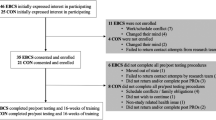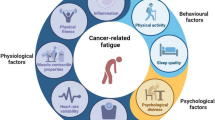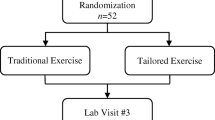Abstract
Purpose
Cancer-related fatigue (CRF) is a common and limiting symptom reported by survivors of cancer, negatively impacting health-related quality of life (HRQoL). Exercise improves CRF, HRQoL, and physical fitness in survivors. Prospective research trials have shown that exercise-associated fitness improvements effects on HRQoL are mediated by CRF; however, this has not been investigated in a pragmatic real-world setting. This study utilizes data from a large heterogenous population of survivors participating in a clinical exercise program to investigate this mediation effect, as well as effects of program attendance.
Methods
Data were collected from 194 survivors completing the BfitBwell Cancer Exercise Program (July 2016–February 2020). Changes in HRQoL, CRF, and fitness were calculated and program attendance collected. Basic correlation analyses were performed. Linear regression analyses were performed to assess mediation by CRF.
Results
All measures of CRF, HRQoL, and physical fitness significantly improved following the exercise program. Improvements in physical fitness were significantly correlated with improvements in HRQoL (r = 0.15–0.18), as was program attendance (r = 0.26) and CRF (r = 0.59). The effects of physical fitness and program attendance on HRQoL were at least partially mediated by the effects of CRF.
Conclusion
This study extends research findings on how exercise programs improve HRQoL in survivors of cancer to a real-world setting. Results indicate that clinical exercise programs should target reductions in CRF in survivors (during or after treatment) through improvements in physical fitness to improve HRQoL and that high attendance should be encouraged regardless of fitness changes.


adapted from Mascha et al. 2013. b shows the mediation of the effects of Δ6MWT on ΔFACT-G by ΔFACIT-Fatigue. All regressions controlled for age and BMI. c shows the mediation of the effects of ΔGS on ΔFACT-G by ΔFACIT-Fatigue. All regressions controlled for cancer diagnosis. *p < 0.05. Δ6MWT change in six-minute walk test, ΔGS change in grip strength, ΔFACT-G change in Functional Assessment of Cancer Therapy – General, ΔFACIT-Fatigue change in Functional Assessment of Chronic Illness Therapy–Fatigue, CI confidence interval, BMI body mass index

Similar content being viewed by others
References
Harrington, C. B., Hansen, J. A., Moskowitz, M., Todd, B. L., & Feuerstein, M. (2010). It’s not over when it’s over: Long-term symptoms in cancer survivors–a systematic review. International Journal of Psychiatry in Medicine, 40(2), 163–181.
Lawrence, D. P., Kupelnick, B., Miller, K., Devine, D., & Lau, J. (2004). Evidence report on the occurrence, assessment, and treatment of fatigue in cancer patients. Journal of the National Cancer Institute Monographs, 2004(32), 40–50.
Bower, J. E., Ganz, P. A., Desmond, K. A., Bernaards, C., Rowland, J. H., Meyerowitz, B. E., & Belin, T. R. (2006). Fatigue in long-term breast carcinoma survivors: A longitudinal investigation. Cancer, 106(4), 751–758.
Cella, D., Davis, K., Breitbart, W., Curt, G., & Fatigue, C. (2001). Cancer-related fatigue: Prevalence of proposed diagnostic criteria in a United States sample of cancer survivors. Journal of Clinical Oncology, 19(14), 3385–3391.
Hofman, M., Ryan, J. L., Figueroa-Moseley, C. D., Jean-Pierre, P., & Morrow, G. R. (2007). Cancer-related fatigue: The scale of the problem. The Oncologist, 12(Suppl 1), 4–10.
Scott, K., & Posmontier, B. (2017). Exercise interventions to reduce cancer-related fatigue and improve health-related quality of life in cancer patients. Holistic Nursing Practice, 31(2), 66–79.
Bower, J. E. (2014). Cancer-related fatigue–mechanisms, risk factors, and treatments. Nature Reviews Clinical Oncology, 11(10), 597–609.
Wu, H. S., & Harden, J. K. (2015). Symptom burden and quality of life in survivorship: A review of the literature. Cancer Nursing, 38(1), E29-54.
Berger, A. M., Mooney, K., Alvarez-Perez, A., Breitbart, W. S., Carpenter, K. M., Cella, D., Cleeland, C., Dotan, E., Eisenberger, M. A., Escalante, C. P., Jacobsen, P. B., Jankowski, C., LeBlanc, T., Ligibel, J. A., Loggers, E. T., Mandrell, B., Murphy, B. A., Palesh, O., Pirl, W. F., … National comprehensive cancer network. (2015). Cancer-related fatigue, version 2.2015. Journal of the National Comprehensive Cancer Network, 13(8), 1012–1039.
O’Higgins, C. M., Brady, B., O’Connor, B., Walsh, D., & Reilly, R. B. (2018). The pathophysiology of cancer-related fatigue: Current controversies. Supportive Care in Cancer, 26(10), 3353–3364.
Ma, Y., He, B., Jiang, M., Yang, Y., Wang, C., Huang, C., & Han, L. (2020). Prevalence and risk factors of cancer-related fatigue: A systematic review and meta-analysis. International Journal of Nursing Studies, 111, 103707.
Aaqbali, M., Al Sinani, M., Aaamani, Z., Aadi, K., & Tanash, M. I. (2021). Prevalence of fatigue in patients with cancer: A systematic review and meta-analysis. Journal of Pain and Symptom Management, 61(1), 167-189.e14.
Speck, R. M., Courneya, K. S., Masse, L. C., Duval, S., & Schmitz, K. H. (2010). An update of controlled physical activity trials in cancer survivors: A systematic review and meta-analysis. Journal of Cancer Survivorship, 4(2), 87–100.
Loughney, L., West, M. A., Kemp, G. J., Grocott, M. P., & Jack, S. (2015). Exercise intervention in people with cancer undergoing adjuvant cancer treatment following surgery: A systematic review. European Journal of Surgical Oncology, 41(12), 1590–1602.
Mishra, S. I., Scherer, R. W., Geigle, P. M., Berlanstein, D. R., Topaloglu, O., Gotay, C. C., & Snyder, C. (2012). Exercise interventions on health-related quality of life for cancer survivors. Cochrane Database of Systematic Reviews, 2012(8), CD007566.
Mishra, S. I., Scherer, R. W., Snyder, C., Geigle, P. M., Berlanstein, D. R., & Topaloglu, O. (2012). Exercise interventions on health-related quality of life for people with cancer during active treatment. Cochrane Database of Systematic Reviews, 2012(8), CD008465.
Campbell, K. L., Winters-Stone, K. M., Wiskemann, J., May, A. M., Schwartz, A. L., Courneya, K. S., Zucker, D. S., Matthews, C. E., Ligibel, J. A., Gerber, L. H., Morris, G. S., Patel, A. V., Hue, T. F., Perna, F. M., & Schmitz, K. H. (2019). Exercise guidelines for cancer survivors: consensus statement from international multidisciplinary roundtable. Medicine and Science in Sports and Exercise, 51(11), 2375–2390.
Kalter, J., Kampshoff, C. S., Chinapaw, M. J., Van Mechelen, W., Galindo-Garre, F., Schep, G., & Buffart, L. M. (2016). Mediators of exercise effects on HRQoL in cancer survivors after chemotherapy. Medicine & Science in Sports & Exercise, 48(10), 1859–1865.
Schwartz, A. L. (1999). Fatigue mediates the effects of exercise on quality of life. Quality of Life Research, 8(6), 529–538.
Buffart, L. M., De Backer, I. C., Schep, G., Vreugdenhil, A., Brug, J., & Chinapaw, M. J. M. (2013). Fatigue mediates the relationship between physical fitness and quality of life in cancer survivors. Journal of Science and Medicine in Sport, 16(2), 99–104.
Buffart, L. M., Galvao, D. A., Chinapaw, M. J., Brug, J., Taaffe, D. R., Spry, N., Joseph, D., & Newton, R. U. (2014). Mediators of the resistance and aerobic exercise intervention effect on physical and general health in men undergoing androgen deprivation therapy for prostate cancer. Cancer, 120(2), 294–301.
Buffart, L. M., Ros, W. J., Chinapaw, M. J., Brug, J., Knol, D. L., Korstjens, I., van Weert, E., Mesters, I., van den Borne, B., Hoekstra-Weebers, J. E., & May, A. M. (2014). Mediators of physical exercise for improvement in cancer survivors’ quality of life. Psycho-Oncology, 23(3), 330–338.
Marker, R. J., Cox-Martin, E., Jankowski, C. M., Purcell, W. T., & Peters, J. C. (2018). Evaluation of the effects of a clinically implemented exercise program on physical fitness, fatigue, and depression in cancer survivors. Supportive Care in Cancer, 26(6), 1861–1869.
Leach, H. J., Marker, R. J., Scorsone, J. J., Peters, J. C., & Purcell, W. T. (2021). Predictors of attendance during an exercise program for cancer survivors. Supportive Care in Cancer, 29(7), 3425–3428.
Covington, K. R., Hidde, M. C., Pergolotti, M., & Leach, H. J. (2019). Community-based exercise programs for cancer survivors: A scoping review of practice-based evidence. Supportive Care in Cancer. https://doi.org/10.1007/s00520-019-05022-6
Foley, M. P., & Hasson, S. M. (2016). Effects of a community-based multimodal exercise program on health-related physical fitness and physical function in breast cancer survivors: A pilot study. Integrative Cancer Therapies, 15(4), 446–454.
Sweegers, M. G., Buffart, L. M., van Veldhuizen, W. M., Geleijn, E., Verheul, H. M. W., Brug, J., Chinapaw, M. J. M., & Altenburg, T. M. (2019). How Does a supervised exercise program improve quality of life in patients with cancer? A concept mapping study examining patients’ perspectives. The Oncologist, 24(6), e374–e383.
Harris, P. A., Taylor, R., Thielke, R., Payne, J., Gonzalez, N., & Conde, J. G. (2009). Research electronic data capture (REDCap)–a metadata-driven methodology and workflow process for providing translational research informatics support. Journal of Biomedical Informatics, 42(2), 377–381.
Denlinger, C. S., Ligibel, J. A., Are, M., Baker, K. S., Demark-Wahnefried, W., Dizon, D., Friedman, D. L., Goldman, M., Jones, L., King, A., Ku, G. H., Kvale, E., Langbaum, T. S., Leonardi-Warren, K., McCabe, M. S., Melisko, M., Montoya, J. G., Mooney, K., Morgan, M. A., … National comprehensive cancer network. (2014). Survivorship: healthy lifestyles, version 22014. Journal of the National Comprehensive Cancer Network, 12(9), 1222–1237.
Marker, R. J., Kittelson, A. J., Jankowski, C. M., Scorsone, J. J., Peters, J. C., & Purcell, W. T. (2022). Development of a reference chart for monitoring cancer-related fatigue throughout a supervised exercise program. Rehabilitation Oncology, 40, 82–88.
Brucker, P. S., Yost, K., Cashy, J., Webster, K., & Cella, D. (2005). General population and cancer patient norms for the Functional Assessment of Cancer Therapy-General (FACT-G). Evaluation and the Health Professions, 28(2), 192–211.
Cella, D. F., Tulsky, D. S., Gray, G., Sarafian, B., Linn, E., Bonomi, A., Silberman, M., Yellen, S. B., Winicour, P., Brannon, J., & Eckberg, K. (1993). The functional assessment of cancer therapy scale: Development and validation of the general measure. Journal of Clinical Oncology, 11(3), 570–579.
Cella, D., Lai, J. S., & Stone, A. (2011). Self-reported fatigue: One dimension or more? Lessons from the Functional Assessment of Chronic Illness Therapy-Fatigue (FACIT-F) questionnaire. Supportive Care in Cancer, 19(9), 1441–1450.
Yellen, S. B., Cella, D. F., Webster, K., Blendowski, C., & Kaplan, E. (1997). Measuring fatigue and other anemia-related symptoms with the Functional Assessment of Cancer Therapy (FACT) measurement system. Journal of Pain and Symptom Management, 13(2), 63–74.
Montan, I., Löwe, B., Cella, D., Mehnert, A., & Hinz, A. (2018). General Population Norms for the Functional Assessment of Chronic Illness Therapy (FACIT)-Fatigue Scale. Value in Health, 21(11), 1313–1321.
Laboratories, A. T. S. C., & o. P. S. f. C. P. F. (2002). ATS statement: Guidelines for the six-minute walk test. American Journal of Respiratory and Critical Care Medicine, 166(1), 111–117.
Mascha, E. J., Dalton, J. E., Kurz, A., & Saager, L. (2013). Statistical grand rounds: Understanding the mechanism: Mediation analysis in randomized and nonrandomized studies. Anesthesia and Analgesia, 117(4), 980–994.
Textor, J., van der Zander, B., Gilthorpe, M. S., Liskiewicz, M., & Ellison, G. T. (2016). Robust causal inference using directed acyclic graphs: The R package “dagitty.” International Journal of Epidemiology, 45(6), 1887–1894.
Tofighi, D., & Mackinnon, D. P. (2011). RMediation: An R package for mediation analysis confidence intervals. Behavior Research Methods, 43(3), 692–700.
Meneses-Echavez, J. F., Gonzalez-Jimenez, E., & Ramirez-Velez, R. (2015). Effects of supervised multimodal exercise interventions on cancer-related fatigue: Systematic review and meta-analysis of randomized controlled trials. BioMed Research International, 2015, 328636.
Cramp, F., & Byron-Daniel, J. (2012). Exercise for the management of cancer-related fatigue in adults. Cochrane Database of Systematic Reviews, 11, CD006145.
Crosswell, A. D., Lockwood, K. G., Ganz, P. A., & Bower, J. E. (2014). Low heart rate variability and cancer-related fatigue in breast cancer survivors. Psychoneuroendocrinology, 45, 58–66.
Fagundes, C. P., Murray, D. M., Hwang, B. S., Gouin, J. P., Thayer, J. F., Sollers, J. J., 3rd., Shapiro, C. L., Malarkey, W. B., & Kiecolt-Glaser, J. K. (2011). Sympathetic and parasympathetic activity in cancer-related fatigue: More evidence for a physiological substrate in cancer survivors. Psychoneuroendocrinology, 36(8), 1137–1147.
Niederer, D., Vogt, L., Thiel, C., Schmidt, K., Bernhorster, M., Lungwitz, A., Jager, E., & Banzer, W. (2013). Exercise effects on HRV in cancer patients. International Journal of Sports Medicine, 34(1), 68–73.
LaVoy, E. C., Fagundes, C. P., & Dantzer, R. (2016). Exercise, inflammation, and fatigue in cancer survivors. Exercise Immunology Review, 22, 82–93.
Vulpen, J. K. V. A. N., Sweegers, M. G., Peeters, P. H. M., Courneya, K. S., Newton, R. U., Aaronson, N. K., Jacobsen, P. B., Galvão, D. A., Chinapaw, M. J., Steindorf, K., Irwin, M. L., Stuiver, M. M., Hayes, S., Griffith, K. A., Mesters, I., Knoop, H., Goedendorp, M. M., Mutrie, N., Daley, A. J., … Buffart, L. M. (2020). Moderators of exercise effects on cancer-related fatigue: A meta-analysis of individual patient data. Medicine and science in sports and exercise, 52(2), 303–314.
Morimoto, A., Suga, T., Tottori, N., Wachi, M., Misaki, J., Tsuchikane, R., & Isaka, T. (2017). Association between hand muscle thickness and whole-body skeletal muscle mass in healthy adults: A pilot study. Journal of Physical Therapy Science, 29(9), 1644–1648.
Bohannon, R. W. (2015). Muscle strength: Clinical and prognostic value of hand-grip dynamometry. Current Opinion in Clinical Nutrition and Metabolic Care, 18(5), 465–470.
Bohannon, R. W. (2015). Association of grip and knee extension strength with walking speed of older women receiving home-care physical therapy. The Journal of Frailty & Aging, 4(4), 181–183.
Acknowledgements
The authors acknowledge Nicole Gleason, Rebecca Kienitz, Jared Scorsone, and Ian Moran for assistance with recruitment, scheduling, and exercise delivery
Funding
REDCap use is supported by NIH/NCRR Colorado CTSI Grant Number UL1 TR002535. DMO was supported by F32DK122652.
Author information
Authors and Affiliations
Contributions
All authors contributed to study conception and design. Material preparation and data collection and analysis were performed by RJM and DMO. The first draft of the manuscript was written by RJM and all authors commented on previous versions of the manuscript. All authors read and approved the final manuscript.
Corresponding author
Ethics declarations
Conflict of interest
The authors have no relevant financial or non-financial interests to disclose.
Ethical approval
Collection and use of clinical program data was approved by the Colorado Multiple Institutional Review Board (COMIRB).
Consent to participate
Data used in this study were collected only from individuals who provided written informed consent for their clinical program data to be used in future research.
Additional information
Publisher's Note
Springer Nature remains neutral with regard to jurisdictional claims in published maps and institutional affiliations.
Supplementary Information
Below is the link to the electronic supplementary material.
Rights and permissions
About this article
Cite this article
Marker, R.J., Ostendorf, D.M., Leach, H.J. et al. Cancer-related fatigue mediates the relationships between physical fitness and attendance and quality of life after participation in a clinical exercise program for survivors of cancer. Qual Life Res 31, 3201–3210 (2022). https://doi.org/10.1007/s11136-022-03173-4
Accepted:
Published:
Issue Date:
DOI: https://doi.org/10.1007/s11136-022-03173-4




